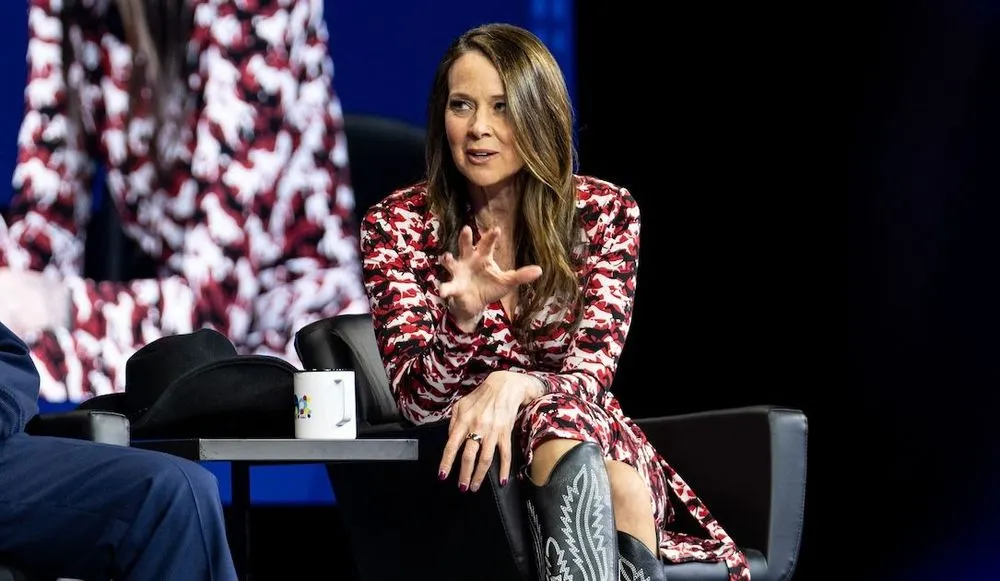Easterly calls for united front against ‘politicizing’ of the cyber industry
The Trump administration’s politicization of cybersecurity and the firing of senior officials should be top of mind for everyone set to gather at next week’s RSA Conference, according to Jen Easterly, the former head of the Cybersecurity and Infrastructure Security Agency (CISA).
Easterly, who led the agency for five years and was instrumental to its evolution, expressed alarm about actions targeting the industry in a LinkedIn post on Friday.
Her comments referenced the firing of Gen. Tim Haugh as the director of the National Security Agency and commander of U.S. Cyber Command, as well as the removal of his deputy Wendy Noble.
They also highlighted a recent executive order targeting former CISA Director Chris Krebs as another example of the president turning cybersecurity into a political football..
“What’s happening now is not a policy disagreement, but something dark: the targeting and removal of nonpartisan public servants and the normalization of loyalty oaths to something other than our Constitution. And if we — who aim to protect critical systems — can’t defend the humans who manage and maintain them, what exactly are we securing?” she said.
Easterly acknowledged that some cybersecurity leaders have spoken out but noted that most prominent leaders and companies have stayed quiet, only issuing private messages of support.
She called out the industry’s lack of public backing for Haugh, Krebs and Noble, arguing that cybersecurity “doesn’t exist in a vacuum” and that the actions are part of a larger trend that risks “hollowing out” and “politicizing” the federal cyber ecosystem.
The firing of the NSA leaders was done with “no explanation” and in spite of “no scandal,” she said, while Krebs was targeted because he “had the courage to speak the truth about the security of our elections.” Trump originally fired Krebs after the CISA director said the 2020 elections had been conducted fairly.
Last week, Krebs left his senior position at cybersecurity company SentinelOne after the Trump administration announced an investigation into his activities as director of CISA.
The April 9 memo revoked Krebs’ security clearance and ordered a broad probe into “any instances where Krebs’ or CISA’s conduct appears to be contrary to the administration’s commitment to free speech and ending federal censorship,” particularly during the 2020 presidential campaign. The order also ordered a review of security clearances with individuals connected to SentinelOne.
While concerns over shareholders and potential damage to stock prices, business or reputations are valid, Easterly said, “some moments in history demand character over calibration.”
“If we stay silent when experienced, mission-driven leaders are sidelined or sanctioned, we risk something greater than discomfort; we risk diminishing the very institutions we are here to protect,” she said.
“If we allow the quiet dismissal of dedicated public servants in our community to pass without comment — we’re not defending national security; we’re compromising it.”
The firings and targeting of experts come at a time when the U.S. faces critical challenges — particularly from Chinese state-sponsored hackers targeting the country’s telecommunications systems and the Treasury Department.
Her comments come amid wider concerns about the Trump administration’s handling of several cybersecurity-focused scandals and the decisions to cut hundreds of workers from CISA.
In addition to widespread firings at CISA, two top officials resigned this week, raising alarms about the agency’s ability to handle multiple current crises. Easterly said in her post that their mission is not just about availability and uptime but about trust.
“The biggest vulnerability we face isn’t a zero-day in our software. It’s a zero-day in our civic integrity,” she said. “And the patch requires all of us.”
Jonathan Greig
is a Breaking News Reporter at Recorded Future News. Jonathan has worked across the globe as a journalist since 2014. Before moving back to New York City, he worked for news outlets in South Africa, Jordan and Cambodia. He previously covered cybersecurity at ZDNet and TechRepublic.

